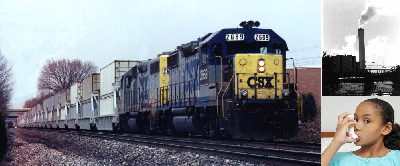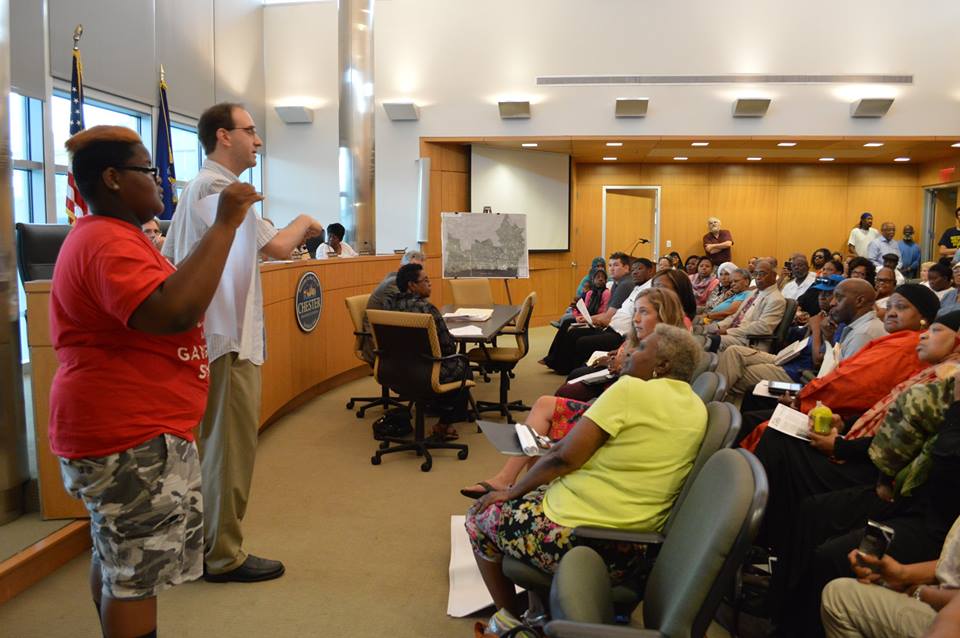
We've been supporting the Chester Environmental Justice group to "derail" plans to send 500,000 tons/year of trash from the richest part of New York City by train to be burned in the low-income, 75% black City of Chester, near Philadelphia, PA. The plan would fulfill a contract Covanta has with New York City to burn this waste for the next 20-30 years. That contract would send an equal amount to Covanta's Niagara Falls, NY incinerator, where people are fighting the trash-by-trail plan as well (see http://stopburningthefalls.com/myths/). Chester hosts the nation's largest trash incinerator, burning up to 3,510 tons/day, and residents have had enough.
We just won a vote of the Chester City Planning Commission on July 11th, 2014, when we got them to vote "NO" on Covanta's proposal for a rail box building to store the rail cars of trash. It'll go to City Council next, and we'll be cranking up the pressure to get them to follow the Planning Commission's advice.
With about 100 people turned out, standing-room-only, we packed the place and made a strong impact. We also had 100 people email the local officials leading up to the meeting.

We demanded that the Chester Planning Commission recommend that City Council vote "NO" on Covanta's NYC trash-by-train proposal. See www.ejnet.org/chester/ for background info and a copy of our presentation.
The second best part was the silence when the Planning Commission chair asked for a second on the proposal to ask Covanta to expand their capacity and add pollution controls (how about just the pollution controls??).
The BEST part was when the chair then moved that they recommend a "NO" vote and asked "all in favor, say aye" ...and the entire room responded in chorus with "AYE." Beautiful and empowering.
Here's the news coverage of it:
Chester planners give thumbs down to Covanta land development plan
By Vince Sullivan, Delaware County Daily Times
Posted: 07/09/14, 11:38 PM EDT
CHESTER — The city planning commission voted Wednesday night not to recommend for approval an application from a trash incinerating company to construct a new building on its property. The city’s planning department approved the application, but after hearing testimony from a number of residents, as well the facility’s operator, the commission declined to endorse the project by a 5-0 vote.
Covanta’s Delaware Valley Resource Recovery facility, the largest energy-from-waste incinerator in the country, is located in the unit block of Highland Avenue and burns municipal solid waste in order to generate electricity, handling about 1.2 million tons of garbage per year. It generates 80 megawatts of electricity at peak performance. The company recently entered into a 20-year contract to bring waste from New York City via train to Wilmington, Del., where it will then be placed on trucks and driven to the Chester facility.
Covanta proposed constructing a 1,000-square-foot office building and 15,000-square-foot rail box transfer building to handle the new mode of delivery. Currently, all of Covanta’s waste is brought in on transfer trailers, but the proposal would enable trucks carrying the rail boxes to deliver some of the waste. The contract with New York City is to incinerate 1 million tons of garbage per year, but would not increase the permitted capacity of the facility, and truck traffic would not increase, according to Covanta Vice President John Waffenschmidt. He said that about 400,000 tons from New York would be brought to the Chester facility, and the rest would go to other Covanta locations.
“We receive all of our waste by truck,” Waffenschmidt said in response to some of the 100 people in attendance at the meeting questioning the application. “The request we have is to have some of that by rail. There is no request at all to increase the amount of waste.”
At least a dozen residents voiced their opposition to the land development request, with most saying that they have suffered health problems due to the facility’s emissions since it began operation in the early 1990s. Claims of asthma and birth defects were made and complaints about foul smells emanating from the facility were voiced.
Waffenschmidt said the emissions from the plant are regulated by the Pennsylvania Department of Environmental Protection and the federal Environmental Protection Agency, and that Covanta complies with those regulations.
“There has been no request to change those limits,” he said.
Planning commission Chairman Anthony L. Moore said that since the proposal was first heard at a June meeting, he and other commission members have been inundated with correspondence from residents and environmental advocates.
“We’ve had public comment at our meeting last month,” Moore said. “We’ve gone to Covanta and asked some of the public’s questions. We’ve also met with an environmental group. We’ve heard your concerns. We’ve gotten 50 to 100 emails. Please know that all of the environmental concerns have been taken into account.”
Mike Ewall, of the Energy Justice Network, gave a condensed version of the hourlong presentation he made to the commission on Tuesday, saying that asthma rates in Chester were three times higher among children than in the rest of the state. He added that Covanta could be burning more trash than they are now.
“They are not burning at full capacity,” Ewall said, citing EPA reports. “They have extra space to burn more.”
He explained that the facility is only operating at 75 percent of its permitted capacity.
A chorus of residents in attendance said that they not only wanted the application denied, but that they wanted the commission to close the incinerator for good.
“The planning commission has no authority to make a company pick up and move out of the city,” Moore said.
“We only make recommendations based on land development and usage issues,” said Commissioner Annette Pyatt.
A motion, requested by Pyatt and made by Moore in her absence when she had to leave the meeting early, sought a permit application for increased capacity from Covanta, as well as the installation of additional pollution control devices. The motion died for lack of a second.
A motion to recommend not approving the application was successful, with many audience members shouting “aye” when it came time for the commissioners to vote.
Waffenschmidt was perplexed by the denial, saying that he thought the planning commission was supposed to examine the application’s conformity with existing land planning regulations.
“There was no factual explanation as to why it was denied,” he said. “We specifically asked for something that meets the code. We don’t know that the vote was based on its merits or whether it was swayed by the residents and their comments.”
Moore said the commission would prepare a resolution to be considered by city council, which would have the final say in approving or denying the application.
